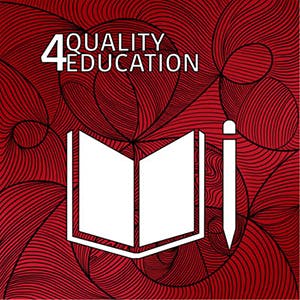SDG 4: Safeguarding the future of education
Former president Nelson Mandela once said: ‘Education is the most powerful weapon which you can use to change the world.’ But education takes time –and we must act now to safeguard the future of education.
Over the years we’ve seen how, through education, people from the most challenging situations have managed to break out and change their circumstances. Indeed, now more than ever, education has several touchpoints which are key to achieving the other Sustainable Development Goals (SDGs). So while much has been achieved through education, learners and students are still left behind over their years of study due to finances, the lack of resources and other deeply systematic issues in our country.
The best way to address some of these challenges would be to ensure inclusive and equitable quality education and promote lifelong learning opportunities for all. But education is so much broader than what is taught in the classroom and by finding solutions that work beyond the classroom (for example providing mentorship, sanitary pads, extra tutorial classes, etc) we can provide opportunities for learners and students across all walks of life.
How education has changed in the context of COVID-19
March 2020 marked the last time many South Africa learners and students received full-time face-to-face interaction with teachers and academics. While this was envisioned to be a short-term situation, the ongoing surge in reported COVID-19 cases has meant that only a fraction of learners and students have returned to schools and universities. And while there have been attempts to reach these remote areas, unfortunately,= South Africa’s infrastructural constraints have failed the youth of this country. This has left thousands, especially those who live in the country’s most remote areas, without access to the most basic and fundamental right of all: education.
There is no doubt that there have always been gaps in the education system. However, the COVID-19 disruption has presented a new way of doing things which has had both positive and negative effects. On the positive side, it has created the opportunity for education to be delivered through the use of digital platforms which is where the world is headed with digital developments such as 4IR. On the negative side, it has highlighted the increasingly urgent need of mobilising all our resources in order to reach everyone, to train and upscale our teachers and to provide content that is fit for purpose and prepares learners and students for the future world of work.
In the context of the South African education landscape, the Finbiz2030 South African Task Team for SDG 4 (Quality Education) set out to identify the gaps and needs in the education value chain, namely primary, secondary and tertiary education. In identifying these gaps, the task team has decided to focus on the needs of the future world of work to pinpoint aspects that may be a hindrance in the development of a learner or student that is truly fit for purpose and displays the competencies required by business in the 21st century and then create impactful initiatives to address these and to, where possible, influence policies around these matters.
Objectives of the task team
South Africa has a great number of challenges as it relates to the education space. This is evidenced by social movements such as #feesmustfall. What makes overcoming these challenges even more difficult is that, to quote Chantyl Mulder, SAICA’s Executive Director for Nation Building, ‘education takes time’.
It is with this backdrop that the task team’s objectives are set out as follows:
Tertiary education
One of the greatest challenges at this level is the development of young professionals who are fit for purpose. Many researchers have looked at the role of education at this level because it seems that currently universities only develop professionals who can recall and regurgitate what they have learnt not put these skills into practice. As a task team, the fundamental skills gap that we have identified include entrepreneurial and pervasive skills. In order to drive these forward, we have created a flagship project called the ‘Student Innovative Entrepreneurship Hub’, or IEH. The IEH will be an annual competition where students are encouraged to come up with innovative entrepreneurship ideas. The winner of this competition will be afforded funds to assist them in the implementation of their idea. We believe such a competition will go a long way in developing these skills at a tertiary level.
Secondary education
Among the challenges identified at this level is the general lack of career guidance information. This has led learners into taking subjects that would generally not lead them to occupations that are in high demand. In addition to a lack of information, challenges also exist with regards to resources such as teachers, study material and even role models for learners. The task team is made up of young professionals from different professions. Therefore, each of us will be creating videos to educate learners around these professions. We also intend to partner with other stakeholders that run initiatives that promote key subjects such as mathematics – this will include extra tutorials in these subjects – in order to supply learners with the resources that they lack.
Primary education
As a task team, we are looking for a way to create excitement for education within young learners while addressing certain social challenges that these learners face. We hope such initiatives will create a love for education that could then contribute to improving the current school dropout rates.
The challenges within our education system are not a government challenge alone. To ensure that we properly address these challenges, as a task team we call upon all South Africans to stand and do something. SDG 17 (Partnership for the Goals) is the key. Therefore, if you are involved in the education value chain and you would like to partner with us, please contact us through SAICA at saica@saica.co.za and let us know how you would like us to collaborate.

